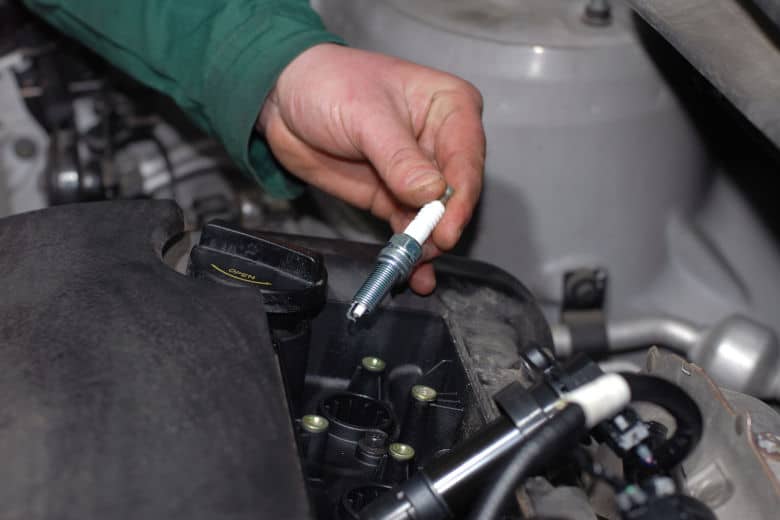by Joshua Thomas
Given all those moving parts on a vehicle’s engine, it is bound to make some noise when driving. While in many instances these noises are hard to notice since there are not very intense, in some cases the sound can be a little unusual such as a ticking.
Ticking sound coming from your engine is not something normal, and hence you cannot afford to ignore it. And this is regardless of whether it happens when the engine is idling or when accelerating at high speeds.
To understand what the ticking noise is all about and hence how best to deal with it, the first step is always to understand some of the possible causes.
Contents

When you hear any strange ticking sounds from your engine, it means it is not running as smoothly as it should. And while many things can cause this issue, the following are the most likely ones.
When your engine does not have enough oil, you can expect issues like overheating and excessive wear to occur. But, what you might not know is that low oil level can also cause a ticking sound.
This occurs due to the inefficient lubrication that occurs when you do not have enough oil. In the absence of adequate oil, the metal engine components are forced to rub against each other more aggressively, which results in the production of a ticking sound.
When the oil level is low, the little of it remaining will not be able to get to the top section of the engine, and this can create a ticking or shrill tapping sound when the engine is running. In most cases, valvetrain components and the timing chain are responsible for the ticking noise.
The rod in your engine usually has a bearing attached to it, and when this bearing goes bad, the rod tends to knock around which then causes the engine ticking sound.
Worn out bearing will cause the rod to move, and as it shifts around, it will make a distinctive ticking sound. And while the rod knock might not cause any changes to the engine temperature, the RPM will change significantly.
With the rod knock problem, the only real solution to eliminate the ticking engine noise will be to replace the entire motor. Although it might be quite expensive, it is inevitable as any other fix will only be a temporary solution.
A leak in the exhaust manifold can also cause the engine ticking noise when both accelerating and idling.
The leak causes the exhaust gases to leak from the exhaust manifold at high pressure. As the exhaust gases try to escape, they will produce a ticking sound.
Besides the noise being super annoying, a leaking exhaust manifold might not look like a serious problem as you can still drive. However, you still need to have it fixed because the excess leakage is not good for your engine.

If you have a loose or cracked spark plug, you are also likely to experience a ticking sound when driving.
When you have a cracked spark plug or the torque is not correct, it will not only fail to provide a spark when starting the car but also make weird sounds when driving.
With damaged spark plugs, the best fix is always to replace them. And note that sometimes the bad spark plug can also strip the cylinder head threads, which means you will also have to replace the cylinder head.
Failing to adjust the valvetrain can also cause a ticking sound. In many cases, these valves are the main cause of the ticking noise, and they should hence always be the first thing that you look at when you have this problem.
The valves have to move fast for a short distance and if their adjustment is not precise enough, they will make the wrong movements, which is then manifested as a ticking sound when accelerating at high speeds.
While still on the valvetrain, it is also worth noting that this unit will consist of several parts working together, and if any of them is worn out, you may also get a ticking sound since the distance that the valves will move will not be precise.
Several front engine accessories can cause ticking noise when driving, and they will include belt tensioners, pulleys, ac compressors, and water pumps.
If any of these accessories are damaged, one of the most common symptoms will be a ticking sound and other weird noises coming from the engine area when driving.
To pinpoint the exact accessory causing the problem, you should use a mechanic's stethoscope. But, note that even with this handy tool, you still need a lot enough experience to detect the exact issue.
Hence, if you suspect that a front-engine accessory is the source of the ticking noise, you will be better off having a mechanic inspect the vehicle.
Normal wear is one of the most common causes of ticking sound in the engine when driving. And this should be obvious given that as the different engine components wear out, they will not run as smoothly as they should and hence the weird noises.
The fuel injector is an example of one such component that can cause a ticking sound as it ages. Fuel injectors have tiny nozzles that tend to make a noticeable tapping or ticking sound when they wear out and start clogging.
Also, note that some fuel injectors in some vehicle models will make ticks when injecting fuel, and so in such situations, the ticks should not be a problem.
Tapping or ticking engine noise can also be a result of a loose or damaged engine fan. The fan does not remain in place when loose or damaged, and as you accelerate, it will tap on surrounding engine components, and hence causing the ticking.
A visual engine fan inspection will let you know when you have a problematic engine fan. And if you do not see any obvious cracks on the fan, you can check the clips and bolts as they can also be loosened, which also causes the same issue.

Now that you know some of the probable reasons why you have a ticking engine noise when accelerating, the next important step is to know how to deal with it.
But this is simple as you only need to fix the underlying problem and the noise should disappear. Here is step by step directions on the best way to tackle the problem.
Regular and timely vehicle maintenance is often enough to fix a huge chunk of vehicle problems, and so a good service can sometimes be all you need to get rid of the ticking noise.
Sometimes the ticking noise will be caused by low oil levels, and so adding more when serving the vehicle should solve the problem.
Also, during a routine service, you can identify any small issue such as loose clips and bolts on your engine fan that might be causing the ticking noise.
If servicing your vehicle does not fix the issues, you will need to give the car, and this is more so the engine area, a thorough inspection to diagnose the problem.
Here you should check things like the spark plug to determine whether they are worn or damaged. And also try to look for issues on other components like the valvetrain that will often result in the ticking noise when they have an issue.
A thorough and complete engine inspection should allow you to identify the underlying issues that you need to fix, and sometimes scanning the vehicle's computer will also be very helpful.
With the faulty part or component identified in the step above, the step that follows is to fix or replace it. And whether you replace, clean or repair it will depend on the specific part you are dealing with and also on the extent of the problem.
However, to be on the safe side, it is always advisable to replace any part that you suspect might be the source of the ticking noise as repairs do not always provide a permanent solution.
Step 4: Test Drive to Check if the Issue is Resolved
Because you cannot be certain the problem is fixed just by replacing or repairing the problematic part, you need to take the vehicle for a test drive.
The ticking noise is often more pronounced when driving at moderate to high speeds, and so you need to make sure you test drive in an area where you can attain these speeds. And remember to keep a keen ear as the noise can sometimes only just subside but not go away completely.
If the noise is still there or you are just not skilled enough to pinpoint the exact cause of the problem, the only alternative left to you is to take the vehicle to a professional mechanic.
Ticking engine noise is easy to ignore if it does not seem to affect the performance of the vehicle in any way. But, you should not overlook it if you want to keep your vehicle driving smoothly.
This annoying engine noise will result from underlying issues such as worn spark plugs, rod knocking, issues with the valvetrain and even low engine oil level.
Most of these causes are simple and easy to fix engine problems, and so there is no excuse to live with the ticking noises. Also, in many instances, regular vehicle maintenance goes a long way in preventing the issue, which is why you should follow a strict vehicle maintenance routine.
Sources
 |
 |
 |
 |

About Joshua Thomas
Joshua Thomas just simply loves cars and willing to work on them whenever there's chance... sometimes for free.
He started CarCareTotal back in 2017 from the advices of total strangers who witnessed his amazing skills in car repairs here and there.
His goal with this creation is to help car owners better learn how to maintain and repair their cars; as such, the site would cover alot of areas: troubleshooting, product recommendations, tips & tricks.
Joshua received Bachelor of Science in Mechanical Engineering at San Diego State University.